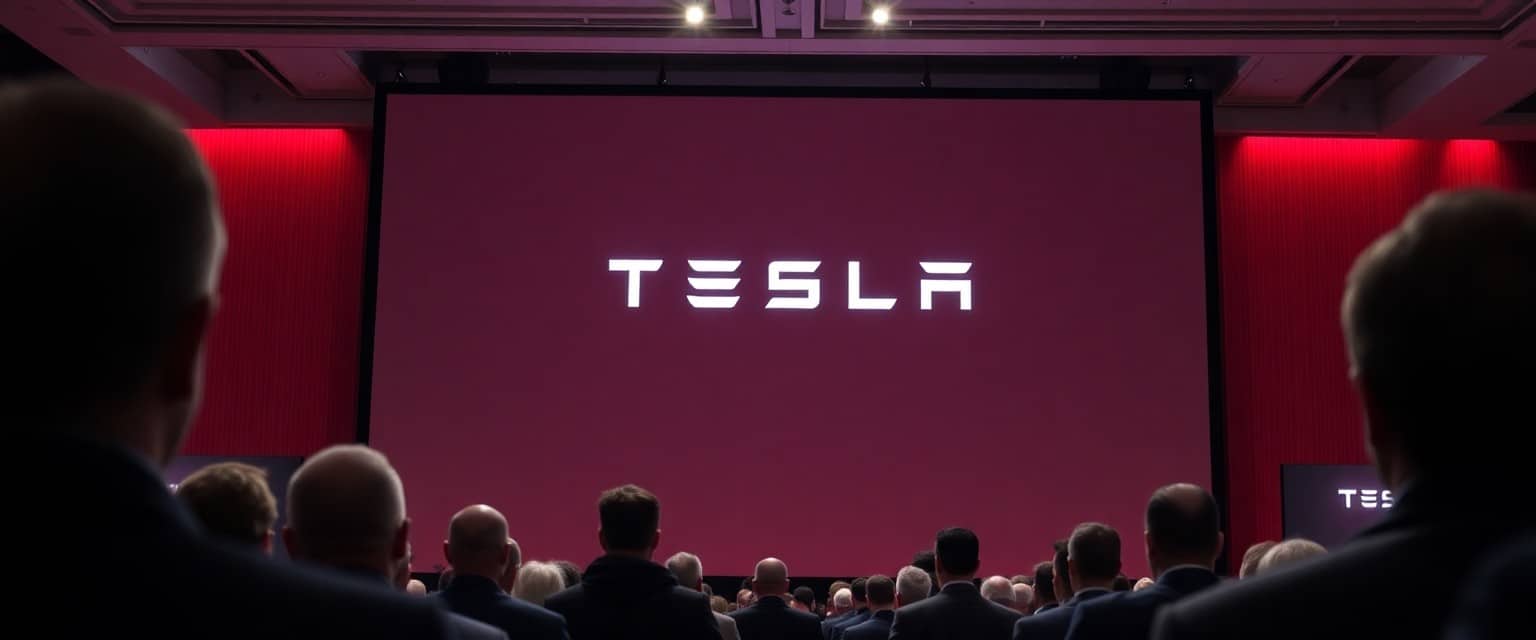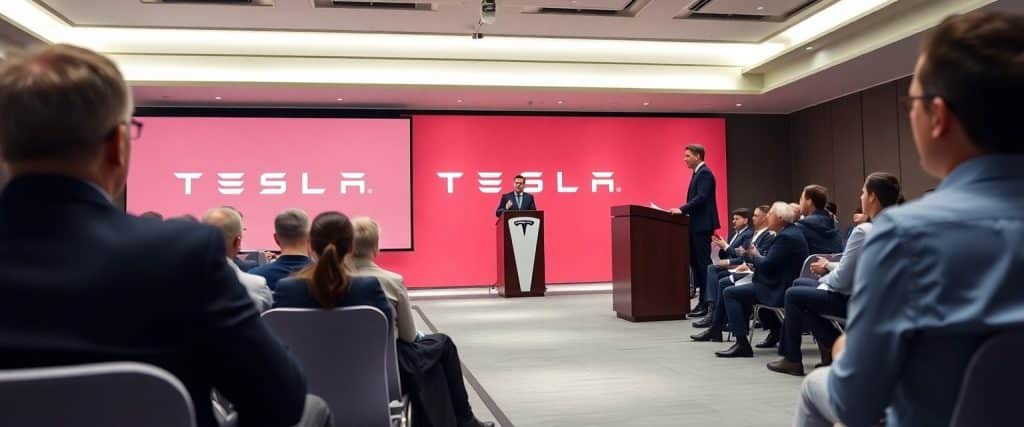Most investors following Tesla will want to know that the company has set its annual shareholder meeting for November 6, though this date is four months past the legal deadline required by Texas law. You should be aware that this delay comes amid significant challenges such as sharp sales declines, falling profits, and growing backlash against CEO Elon Musk’s political actions. While the meeting offers you a chance to engage with the board, past experiences suggest the company may control which questions are addressed, reflecting ongoing tensions between Tesla’s leadership and its shareholders.
Corporate Governance and Its Implications for Tesla
Tensions around Tesla’s governance have intensified as you watch the company navigate mounting investor scrutiny and legal obligations. The delayed annual meeting underscores how governance practices can affect shareholder confidence, especially when the company misses the legally mandated meeting deadlines. Tesla’s board faces pressure not only to address operational concerns like plunging sales and profits but also to manage shareholder relations amid controversies surrounding CEO Elon Musk’s political entanglements, which have had tangible impacts on brand perception and investor trust.
Texas Law on Shareholder Meetings
Under Texas law, Tesla must hold its annual shareholder meeting within 13 months of the previous meeting, a requirement meant to ensure timely accountability. Setting the meeting for November 6 places Tesla well past this deadline, a legal misstep that shareholders have publicly challenged. This lag highlights how even high-profile companies like Tesla cannot sidestep state laws designed to protect shareholder rights and uphold standard corporate governance timelines.
Shareholder Rights and Responsibilities
You can ask questions at Tesla’s annual meetings, but getting the opportunity often depends on the company’s filtering, as they control which shareholder questions are addressed publicly. While shareholders can initiate proxy battles to influence company direction or board composition, these efforts tend to be costly and rarely succeed, leaving individual investors with limited leverage despite their formal rights.

Shareholder Discontent: The Call for Accountability
Your position as a Tesla shareholder places you amid rising calls for greater accountability, especially given the company’s delayed annual meeting and its deepening operational challenges. The ongoing tension reflects growing unease with how Tesla’s leadership has navigated recent setbacks, from historic sales declines and plunging profits to controversies surrounding Elon Musk’s political activities. With legal deadlines ignored and transparency questioned, shareholders like you are demanding more than just meetings—they want clear, decisive action that addresses the company’s trajectory and Musk’s influence on its future.
Key Concerns Raised by Investors
You’ll find that investors are focusing their concerns on several critical issues: the four-month delay past Texas’ legal deadline for the annual meeting, the sharp downturn in Tesla’s sales and stock price, and the looming shake-up of US electric vehicle incentives threatening billions in revenue. Musk’s increasingly controversial political conduct, including prior ties to Donald Trump, has further aggravated investors, who fear lasting damage to Tesla’s brand and value if governance doesn’t improve promptly.
The Role of Institutional Investors
Institutional investors, including those managing public pension funds like New York City Comptroller Brad Lander, have stepped up their scrutiny by formally demanding Tesla comply with governance rules. You should note how such investors wield significant influence given their large shareholdings and public responsibility, channeling shareholder frustrations into coordinated pressure on the board to ensure legal compliance and greater transparency, signaling a shift toward more active engagement.
Digging deeper, institutional investors have mobilized through collective action, such as signing the shareholder letter that challenged Tesla’s failure to schedule the meeting on time. Their role extends beyond mere oversight; these investors have the resources and patience to pursue costly proxy battles if necessary, although success remains elusive. Their commitment reflects not just financial interest but fiduciary duty, emphasizing that Tesla’s board must align corporate governance with shareholder expectations, especially in light of recent volatility and governance lapses.
The Timing of Tesla’s Annual Meeting: A Double-Edged Sword
Scheduling the annual meeting for November 6 places Tesla well past the four-month legal deadline mandated by Texas law, where the company is incorporated. While this late date could offer management additional time to prepare responses amid mounting investor pressures, it also amplifies shareholder frustration and invites scrutiny over Tesla’s corporate governance practices. You should recognize that this delay signals deeper tensions between Tesla’s leadership and the shareholders demanding transparency, especially as the company wrestles with sales slumps, profit declines, and heightened reputational risks tied to CEO Elon Musk.
Context of the November 6 Date
The November 6 meeting is not just a date on the calendar—it arrives well beyond the 13-month timeframe required for annual meetings under state law. Shareholders, including influential Democratic officials overseeing public pension funds, flagged this timing as a breach of standard practice. You can view this delay as Tesla leveraging a legal gray area, which may buy time but risks alienating investors who want timely accountability amid rapid changes in the EV market and government incentive structures.
Legal and Reputational Risks Involved
By missing the legal deadline for its annual shareholder meeting, Tesla exposes itself to potential legal challenges and damaged credibility. Shareholders like New York City Comptroller Brad Lander stress that corporate governance rules are non-negotiable protections, not optional guidelines. You must factor in how this delay feeds narratives of mismanagement or board complacency, potentially destabilizing investor confidence during a period when Tesla’s market position is already vulnerable.
Beyond the deadline violation, this postponement could trigger shareholder unrest or proxy battles aimed at reforming the board or curtailing Musk’s influence—efforts that have historically been costly and difficult but may gain traction given escalating concerns. Tesla’s refusal to offer a reason for the delay further suggests an unwillingness to engage openly, which can magnify shareholder distrust. This tension unfolds against a backdrop of harsh sales declines, shrinking profits, and increasing political backlash against Musk, all factors that compound the reputational damage and legal scrutiny Tesla now navigates.
The Broader Impact of Elon Musk’s Controversies
Elon Musk’s recent controversies have rippled beyond just Tesla’s boardroom, casting shadows over the company’s public perception and investor confidence. As your exposure to Tesla grows, you’ll notice how Musk’s political activities and leadership style increasingly influence the brand’s reputation, creating tangible challenges in maintaining shareholder trust and market position amid declining sales and profits.
Influence of Political Activities on Brand Image
Musk’s political engagement and connections, especially his past affinity with former President Trump, have sparked significant backlash, affecting the Tesla brand’s neutrality in the eyes of many consumers. This polarization has led to lasting damage on Tesla’s public image, alienating some loyal customers and making it harder for you to predict how future political associations might impact brand loyalty and overall sales.
Investor Sentiment and Market Dynamics
Investor sentiment is under pressure as you watch Tesla’s stock price and profits plunge alongside the company’s worst sales decline ever. Upcoming changes in US electric vehicle incentives threaten to cost Tesla billions, while Musk’s controversial actions further unsettle the market. This combination fuels uncertainty, making your investment decisions more complex amid heightened volatility and governance concerns.
The stock’s recent performance reflects a broader unease among investors, with Tesla’s share price dropping by over 30% since its peak last year. Analysts highlight that US policy shifts on EV subsidies could reduce Tesla’s competitive edge by $3-5 billion annually, casting a long shadow on future growth prospects. Meanwhile, Musk’s political controversies introduce unpredictable risks that compound investor hesitation, signaling a period where you must closely monitor both corporate governance developments and external market forces before committing further capital.
Navigating Public Relations: Tesla’s Stakeholder Strategy
Tesla’s recent delay in scheduling its annual meeting reflects broader tensions with its shareholders, highlighting a need for a recalibrated approach to public relations. The company faces an uphill battle managing investor concerns amid steep sales declines, plunging profits, and controversial CEO actions. Your perspective as an investor will be shaped by how Tesla addresses transparency and governance, especially since delayed responsiveness risks deepening mistrust. Effective communication strategies must now balance Musk’s polarizing presence with clear corporate messaging to maintain confidence in the company’s future.
Approaches to Improve Investor Relations
Engaging shareholders more openly could help Tesla rebuild its rapport. Instituting greater transparency with unfiltered Q&A sessions during earnings calls can give investors a stronger voice. Providing timely updates on financial performance and strategic pivots, especially regarding changes in US EV incentives, would demonstrate attentiveness to shareholder concerns. Tesla might also benefit from involving independent board members more actively in communications to distance governance processes from CEO controversies, reinforcing corporate accountability where you need it most.
Potential Actions for Restoring Shareholder Trust
To regain trust, Tesla should consider concrete governance reforms, such as setting firm limits on Musk’s involvement in political activities that impact the brand. Introducing clear policies on shareholder engagement beyond annual meetings, possibly through more frequent investor forums, could showcase commitment to accountability. Additionally, carefully addressing the fallout from the voided 2018 pay package with transparent legal updates will keep you informed and reassured about executive compensation oversight.

Summing up
Considering all points, you see that Tesla’s delayed announcement of its annual shareholder meeting highlights ongoing tensions between the company and its investors. Despite legal requirements, the meeting is set four months late amid declining sales and growing concerns over CEO Elon Musk’s political actions. While you can engage during these meetings, your influence remains limited without costly proxy battles. Staying informed and vigilant allows you to better understand Tesla’s challenges and hold the company accountable as it navigates a difficult period ahead.
Frequently Asked Questions
When is Tesla’s 2025 annual shareholder meeting?
Tesla has scheduled its 2025 annual shareholder meeting for November 6, 2025.
Why was there a delay in announcing the meeting date?
The delay was due to pressure from over 20 Tesla shareholders who urged the company to set a meeting date in compliance with Texas law, which requires annual meetings within 13 months of the previous one.
What are the key agenda items for the meeting?
Key topics include CEO Elon Musk’s compensation package, the integration of xAI’s Grok chatbot into Tesla vehicles, and the expansion of Tesla’s robotaxi service.
How can shareholders participate in the meeting?
Shareholders can participate by submitting proposals for inclusion in the proxy statement by July 31, 2025. The meeting will be accessible both virtually and in person at Tesla’s Gigafactory in Austin, Texas.
What is the deadline for submitting proposals?
The deadline for submitting shareholder proposals is July 31, 2025.

